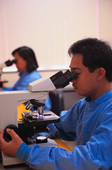
(SOURCE: National Society of Genetic Counselors, news release, June 2008)
SUNDAY, June 15 (HealthDay News) -- On Father's Day, as a gift to themselves, all men should ask three key questions about their risk for prostate cancer, says the National Society of Genetic Counselors (NSGC).
The first question:
What could put me at risk for prostate cancer?
Men with a close relative with prostate cancer, like a brother or a father, have twice the normal risk of developing prostate cancer over their lifetime, the NSGC said. The risk increases if the relative was diagnosed at an early age (before age 70). Other risk factors include age, race and diet.
The second question:
Is genetic testing for prostate cancer available?
It is, but commercial genetic testing for prostate cancer is not widely recommended, may not always provide straightforward answers, and may not be appropriate for the majority of men with prostate cancer, said the NSGC. Men should consult a genetic counselor to help them identify the most appropriate test.
The third question:
If I decide to have genetic testing, what should I expect?
Genetic testing for prostate cancer is complex, because not all cases of the disease are alike. Multiple genes and environmental factors can play a role, and the genes that cause prostate cancer can vary depending on race or ethnic background, the NSGC said. A genetic counselor can help determine which test or tests specifically address a man's medical concerns.
Any man considering genetic testing for prostate cancer should meet with a genetic counselor, said NSGC president Angela Trepanier.
"Genetic tests for prostate cancer can help save lives, but they can also raise more questions than answers. It is important that someone who has expertise in genetics helps you understand and interpret your risks, options and the impact that test results could have on you and your family," Trepanier said in a prepared statement.
Other than skin cancers, prostate cancer is the second most common form of cancer among American men.
More information
The National Cancer Institute has more about prostate cancer screening.
Copyright © 2008 ScoutNews, LLC. All rights reserved. 
HealthDayNews articles are derived from various sources and do not reflect federal policy. healthfinder.gov does not endorse opinions, products, or services that may appear in news stories. For more information on health topics in the news, visit the healthfinder.gov health library.